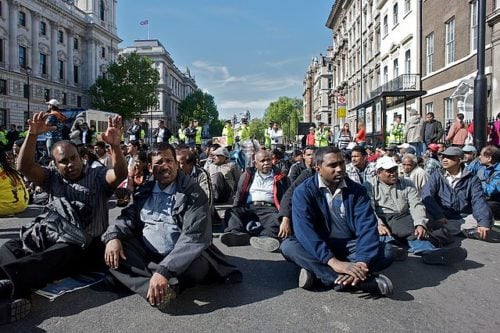UN Issues Landmark Guidance on Peaceful Protest
Protecting Peaceful Protest
PUBLISHED: JULY 30, 2020
Protecting the right of peaceful assembly has never been more crucial. In recent years, protesters around the globe have gathered in the streets and online to push for change in the face of shrinking civic space. The COVID-19 pandemic has exacerbated this, with significant restrictions on gatherings and protests imposed in the name of public health.
It is particularly timely and vital, then, that the UN Human Rights Committee has adopted pivotal new guidance on the right of peaceful assembly. On July 27, 2020, the Committee issued General Comment No. 37: the Committee’s first authoritative guidance on the right of peaceful assembly, as enshrined in article 21 of the International Covenant for Civil and Political Rights. The Comment sets forth principles and standards on a range of important issues relating to protests and gatherings, including:
- Online Assemblies: The Comment recognizes that “article 21 protection … extends to remote participation in, and organization of, assemblies, for example online.” The Comment thus makes clear that digitally-mediated gatherings – on Twitter feeds and Facebook walls, in chat rooms and community listservs, and via the technologies of the future – are protected by the right of peaceful assembly. In contexts where physical assembly rights are restricted, including in response to the COVID-19 epidemic, such virtual gatherings play a critical role in enabling collective deliberation and expression. The Comment’s unequivocal statement on this issue will provide an important tool in advocating for the full respect and facilitation of the right to assemble online.
- Internet Shutdowns: The Comment states plainly that “States parties must not … block or hinder Internet connectivity in relation to peaceful assemblies,” and that they “should ensure that the activities of Internet service providers and intermediaries do not unduly restrict assemblies or the privacy of assembly participants.” As the UN Special Rapporteur on the rights to freedom of peaceful assembly and of association has observed, there has been a global trend in recent years of network disruptions in connection with public demonstrations and peaceful protests, with more than 40 such disruptions taking place in 2018. The Comment’s clear statement that this practice unacceptable will aid in pushing back against this repressive practice.
- LGBT Rights and Peaceful Protest: The Comment forcefully articulates that restrictions on peaceful assemblies may not “be imposed because of opposition to expressions of sexual orientation or gender identity.” This principle that assembly rights may not be restricted based on narrow conceptions of morality will provide support to local activists working to remove legal barriers to the ability of LGBT activists to exercise their right of peaceful assembly.
The Comment also presents important guidance relating to the policing of peaceful assemblies, notification and authorization requirements, and the surveillance and monitoring of assemblies. With its rigorous and progressive treatment of critical issues facing the exercise of peaceful assembly rights, the Comment will empower and support advocacy by civil society around the world.
The Committee’s adoption of General Comment No. 37 follows a two-year process of widespread consultation, drafting, and refining the Comment’s provisions. The International Center for Not-for-Profit Law (ICNL) provided assistance to the Committee, working with the European Center for Not-for-Profit Law to identify priority issues, create a digital library for resources on assembly, and ensure civil society input into the Comment. ICNL organized consultations on the Comment with activists and experts from the Middle East/North Africa region, and ICNL experts and partners participated in additional meetings with Committee members in Bangkok, Cambridge, Glion, Johannesburg, and Mexico City. ICNL also provided comments to the Committee on a prior draft of the Comment, which influenced the final text on issues ranging from the definition of assembly to the scope of protection for online assemblies.
ICNL congratulates the Committee on the adoption of General Comment No. 37. In the coming months, ICNL will work with Committee members and local partners to promote and disseminate the Comment, and to ensure that this vital guidance is deployed to protect peaceful assembly rights in practice.
For more on General Comment 37 and how it impacts civil society, visit our resource page.
Sign up for our newsletters
Sign up
